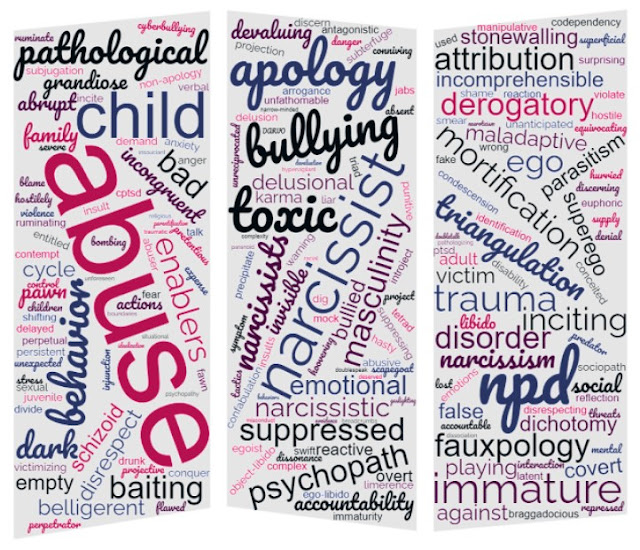
"A Pɪᴄᴛᴜʀᴇ ɪs Wᴏʀᴛʜ ᴀ Tʜᴏᴜsᴀɴᴅ Wᴏʀᴅs" "ᴀ Tʜᴏᴜsᴀɴᴅ Wᴏʀᴅs ᴀʀᴇ ᴡᴏʀᴛʜ ᴡᴀʏ ᴍᴏʀᴇ ᴛʜᴀɴ ᴛʜᴇ ᴘɪᴄᴛᴜʀᴇ."
~ Wᴏʀᴅs ᴀɴᴅ Tᴇʀᴍs Gʟᴏssᴀʀʏ Pᴀɢᴇs
~ Gloss.O.P.Q ~ Gloss.R.S ~ Gloss.T ~ Gloss.U.V.W.X.Y

F, is for,,
- FAINT OF HEART =
- FAKE PERSONALITY DISORDER =
- FALSE HOPE = A pathological hope.
- FATHOM =
- FAUXPOLOGY = Manipulative Apology
- FAWN RESPONSE =
- FAWNING = Fawning refers to consistently abandoning your own needs to serve others to avoid conflict, criticism, or disapproval. Fawning is also called the “please and appease” response and is associated with people-pleasing and codependency. “Fawn types seek safety by merging with the wishes, needs, and demands of others. Fawning is a trauma response where a person behaves in a people-pleasing way to avoid conflict and establish a sense of safety. When faced with trauma, fawning serves as a coping mechanism. By developing a fawn trauma response, trauma survivors attempt to avoid conflict by pleasing their abuser.
- FEMININITY =
- FLAWED PERCEPTION =
- FLYING MONKEYS = Enablers
- FRAUD =
- FRAUDULENT =
- FRAUDULENT CONVEYANCE = Also known as Fraudulent Transfer.
- FRAUDULENT MISREPRESENTATION =
- DEFRAUD =
- FREUDIAN PSYCHOLOGY =
G, is for,,
- GASLIGHTING = Gaslighting is a form of psychological manipulation in which the abuser attempts to sow self-doubt and confusion in their victim's mind. Typically, gaslighters are seeking to gain power and control over the other person, or seeking to avoid accountability for something they said or did, by distorting reality and forcing you to question your own reality of truth, judgment or intuition. Gaslighting is the action of repetitively (and often brazenly) lying to someone to manipulate, and ultimately control them and the relationship. It could be divided into four different types: outright lying, manipulation of reality, scapegoating and coercion. Or they may just actually be unable to accept that they were wrong, the problem is them, and what your saying that happened, actually happened. You'll know you're being Gaslighted when: they deny or scoff at your recollection of an event. .. Insist you said or did things you know you didn't do. .. Call you “too sensitive” or “crazy” when you express your needs or concerns. .. Express doubts to others about your feelings, behavior, and state of mind. .. Twist or retell an event to shift blame to you, trying to make you doubt yourself. Gaslighting is a form of emotional abuse in relationships (with a lover, a family member, a friend, etc.,). It can all start with a reaction after you saying something; that they respond with "are you kidding me?", and if you let that go, then they'll eventually build it into "are you kidding me?, that doesn't make sense," or "you don't know what you're talking about". So make sure to nip that in the bud, and make sure you scroll down this page to see "WHAT NARCISSISTS SAY FREQUENTLY" for more needed bud nipping. Gaslighting happens when one person convinces their target that they're remembering things wrong or that they're misinterpreting events. The gaslighter is trying to manipulate the other person and presents their own thoughts and feelings as the truth. Gaslighting is a form of narcissistic abuse that causes a person to question their sanity and doubt their perception of reality.
- GENIUS =
- GOD COMPLEX VS NARCISSIST =
- GOING NO CONTACT =
- GOLDEN CHILD =
- GOLDEN CHILD ADULT = Because golden children are told that they must be good at everything and feel pressured to live up to unreasonable expectations, they are sometimes unable to develop their own sense of self. This can cause low self-esteem, which lays the foundation for becoming a narcissist.
- GOLDEN CHILD SYNDROME =
- GOLDEN CHILD VS LOST CHILD =
- GOLDEN CHILD VS SCAPEGOAT =
- GOOD PERSON =
- BEING A BEAUTIFUL PERSON =
- BEING A GOODY GOODY = Used as a derogatory statement against people like me. Go figure.
- GREY ROCK = Method while talking to a narc. Short not sweet. Grey rocking is a technique used to divert a toxic person's behavior by acting as unresponsive as possible when you're interacting with them. For example, using the grey rock method involves deliberate actions like avoiding eye contact or not showing emotions during a conversation, keeping it short and less sweet than Yellow Rock. The less the talk the less response from the narc.
- GREY ROCK YELLOW ROCK = “Grey Rock is the non-polite version of Yellow Rock”, while dealing with a narc.
- YELLOW ROCK = Method while talking to a narc. Short and sweet. “Yellow Rock” is a polite version of “Gray Rock”, in which you are still uninteresting and unresponsive, but there is warmth there. In the above example, a Yellow Rock response might be “thanks for telling me, I'll check it out, I have to go now, so we'll talk again another time."
H, is for,,
- HEALING VS RECOVERY =
- HIGHLY SENSITIVE PERSON (HSP) = Not a disorder, not a diagnosis, not a medical condition, but a way I am blessed to be. Highly Sensitive Person, or HSP, is a term coined by psychologist Elaine Aron. According to Aron's theory, HSPs are a subset of the population who are high in a personality trait known as sensory-processing sensitivity, or SPS. A highly sensitive person (HSP) is a neurodivergent individual who is thought to have an increased or deeper central nervous system sensitivity to physical, emotional, or social stimuli.
- HISTRIONIC NARCISSIST = Histrionic means: melodramatic, theatrical, affected, dramatic, exaggerated, actorly, actressy, stagy, showy, artificial, overacted, overdone, unnatural, etc. Histrionic personality disorder (HPD) is characterized by a pervasive pattern of attention-seeking behaviors and a theatrical level of emotional reactions. The condition is usually life-long, though onset is typically in late adolescence or early adulthood. Histrionic narcissists may establish relationships with ulterior motives, such as gaining a social advantage or unearned privileges. They may view others as tools to achieve their goals. For example, they may become involved with someone because it makes them look good (e.g., status). Constant need for attention, Angry outbursts and difficulty managing anger, Shift emotions rapidly, Highly suggestible and easily influenced, Lack of intimacy, Dramatic displays of emotion, Focus on physical appearance, Overly emotional, Provocative actions, Difficulty showing emotions, Lack of consideration for others, Requiring excessive admiration, Very dramatic, Impressionistic and vague speech, Insecure.
- HOARDING DISORDER = Thought as a form of OCD. Hoarding disorder is a mental health problem that a doctor can diagnose. But you might also experience hoarding as part of another mental or physical health problem. Hoarding disorder is an ongoing difficulty throwing away or parting with possessions because you believe that you need to save them. You may experience distress at the thought of getting rid of the items. You gradually keep or gather a huge number of items, regardless of their actual value. Some researchers believe hoarding can relate to childhood experiences of losing things, not owning things, or people not caring for you. This might include experiences like: Money worries or living in poverty in childhood. Having your belongings taken or thrown away by someone. The main talking therapy used to treat hoarding disorder is cognitive behavioural therapy (CBT). This focuses on how your thoughts, beliefs and attitudes affect your feelings and behaviour. Evidence suggests that both individually and group CBT can help. Compulsive hoarding is a progressive and chronic condition that begins early in life. Left untreated, its severity increases with age. Compulsive hoarding should be considered a distinct clinical syndrome, separate from OCD.
- HOOVERING =
- HOSTILE =
- HYPERVIGILANT = Against Narcissism

~ WORDS AND TERMS GLOSSARY PAGES

- FYI: Last Words: Did you know?
 A recent meta-analysis of 437 studies found a strong relationship between narcissism and violence, where narcissistic individuals are more likely to commit acts of violence than their non-narcissistic counterparts. In order to be considered a psychopath, many other psychopathic symptoms such as a lack of attachment to others, superficial charm, dishonesty, manipulativeness and reckless risk-taking come into play.
A recent meta-analysis of 437 studies found a strong relationship between narcissism and violence, where narcissistic individuals are more likely to commit acts of violence than their non-narcissistic counterparts. In order to be considered a psychopath, many other psychopathic symptoms such as a lack of attachment to others, superficial charm, dishonesty, manipulativeness and reckless risk-taking come into play. - It's certain that psychopathic narcissists exist
 and here's the kicker: If a person has psychopathic traits, then they tend to have narcissistic and Machiavellian traits too. People with these personalities can't sense other people's feelings or see the world from any perspective apart from their own. They don't have a sense of conscience or guilt to stop them behaving immorally.
and here's the kicker: If a person has psychopathic traits, then they tend to have narcissistic and Machiavellian traits too. People with these personalities can't sense other people's feelings or see the world from any perspective apart from their own. They don't have a sense of conscience or guilt to stop them behaving immorally.
No comments:
Post a Comment